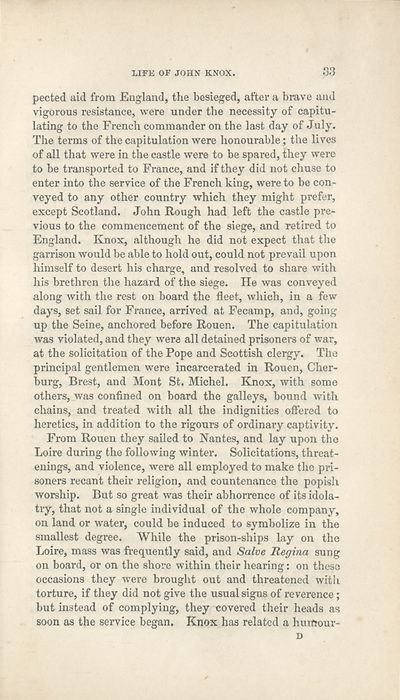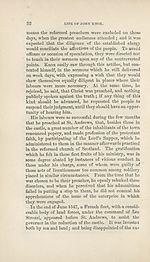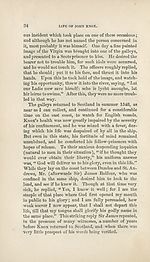Download files
Complete book:
Individual page:
Thumbnail gallery: Grid view | List view

LIFE OF JOHN KNOX.
33
pected aid from England, the besieged, after a brave and
vigorous resistance, were under the necessity of capitu¬
lating to the French commander on the last day of July.
The terms of the capitulation were honourable; the lives
of all that were in the castle were to be spared, they were
to be transported to France, and if they did not chuse to
enter into the service of the French king, were to be con¬
veyed to any other country which they might prefer,
except Scotland. John Rough had left the castle pre¬
vious to the commencement of the siege, and retired to
England. Knox, although he did not expect that the
garrison would be able to hold out, could not prevail upon
himself to desert his charge, and resolved to share with
his brethren the hazard of the siege. He was conveyed
along with the rest on board the fleet, which, in a few
days, set sail for France, arrived at Fecamp, and, going
up the Seine, anchored before Rouen. The capitulation
was violated, and they were all detained prisoners of war,
at the solicitation of the Pope and Scottish clergy. The
principal gentlemen were incarcerated in Rouen, Cher-
burg, Brest, and Mont St. Michel. Knox, with some
others, was confined on board the galleys, bound with
chains, and treated with all the indignities offered to
heretics, in addition to the rigours of ordinary captivity.
From Rouen they sailed to Nantes, and lay upon the
Loire during the following winter. Solicitations, threat-
enings, and violence, were all employed to make the pri¬
soners recant their religion, and countenance the popish
worship. But so great was their abhorrence of its idola¬
try, that not a single individual of the whole company,
on land or water, could be induced to symbolize in the
smallest degree. While the prison-ships lay on the
Loire, mass was frequently said, and Salve Regina sung
on board, or on the shore within their hearing: on these
occasions they were brought out and threatened with
torture, if they did not give the usual signs of reverence;
but instead of complying, they covered their heads as
soon as the service began. Knox has related a humour-
33
pected aid from England, the besieged, after a brave and
vigorous resistance, were under the necessity of capitu¬
lating to the French commander on the last day of July.
The terms of the capitulation were honourable; the lives
of all that were in the castle were to be spared, they were
to be transported to France, and if they did not chuse to
enter into the service of the French king, were to be con¬
veyed to any other country which they might prefer,
except Scotland. John Rough had left the castle pre¬
vious to the commencement of the siege, and retired to
England. Knox, although he did not expect that the
garrison would be able to hold out, could not prevail upon
himself to desert his charge, and resolved to share with
his brethren the hazard of the siege. He was conveyed
along with the rest on board the fleet, which, in a few
days, set sail for France, arrived at Fecamp, and, going
up the Seine, anchored before Rouen. The capitulation
was violated, and they were all detained prisoners of war,
at the solicitation of the Pope and Scottish clergy. The
principal gentlemen were incarcerated in Rouen, Cher-
burg, Brest, and Mont St. Michel. Knox, with some
others, was confined on board the galleys, bound with
chains, and treated with all the indignities offered to
heretics, in addition to the rigours of ordinary captivity.
From Rouen they sailed to Nantes, and lay upon the
Loire during the following winter. Solicitations, threat-
enings, and violence, were all employed to make the pri¬
soners recant their religion, and countenance the popish
worship. But so great was their abhorrence of its idola¬
try, that not a single individual of the whole company,
on land or water, could be induced to symbolize in the
smallest degree. While the prison-ships lay on the
Loire, mass was frequently said, and Salve Regina sung
on board, or on the shore within their hearing: on these
occasions they were brought out and threatened with
torture, if they did not give the usual signs of reverence;
but instead of complying, they covered their heads as
soon as the service began. Knox has related a humour-
Set display mode to:
![]() Universal Viewer |
Universal Viewer | ![]() Mirador |
Large image | Transcription
Mirador |
Large image | Transcription
| Antiquarian books of Scotland > Scotland/Scots > Life of John Knox ; and, The life of Alexander Henderson > (51) |
|---|
| Permanent URL | https://digital.nls.uk/131832916 |
|---|
| Description | Thousands of printed books from the Antiquarian Books of Scotland collection which dates from 1641 to the 1980s. The collection consists of 14,800 books which were published in Scotland or have a Scottish connection, e.g. through the author, printer or owner. Subjects covered include sport, education, diseases, adventure, occupations, Jacobites, politics and religion. Among the 29 languages represented are English, Gaelic, Italian, French, Russian and Swedish. |
|---|

